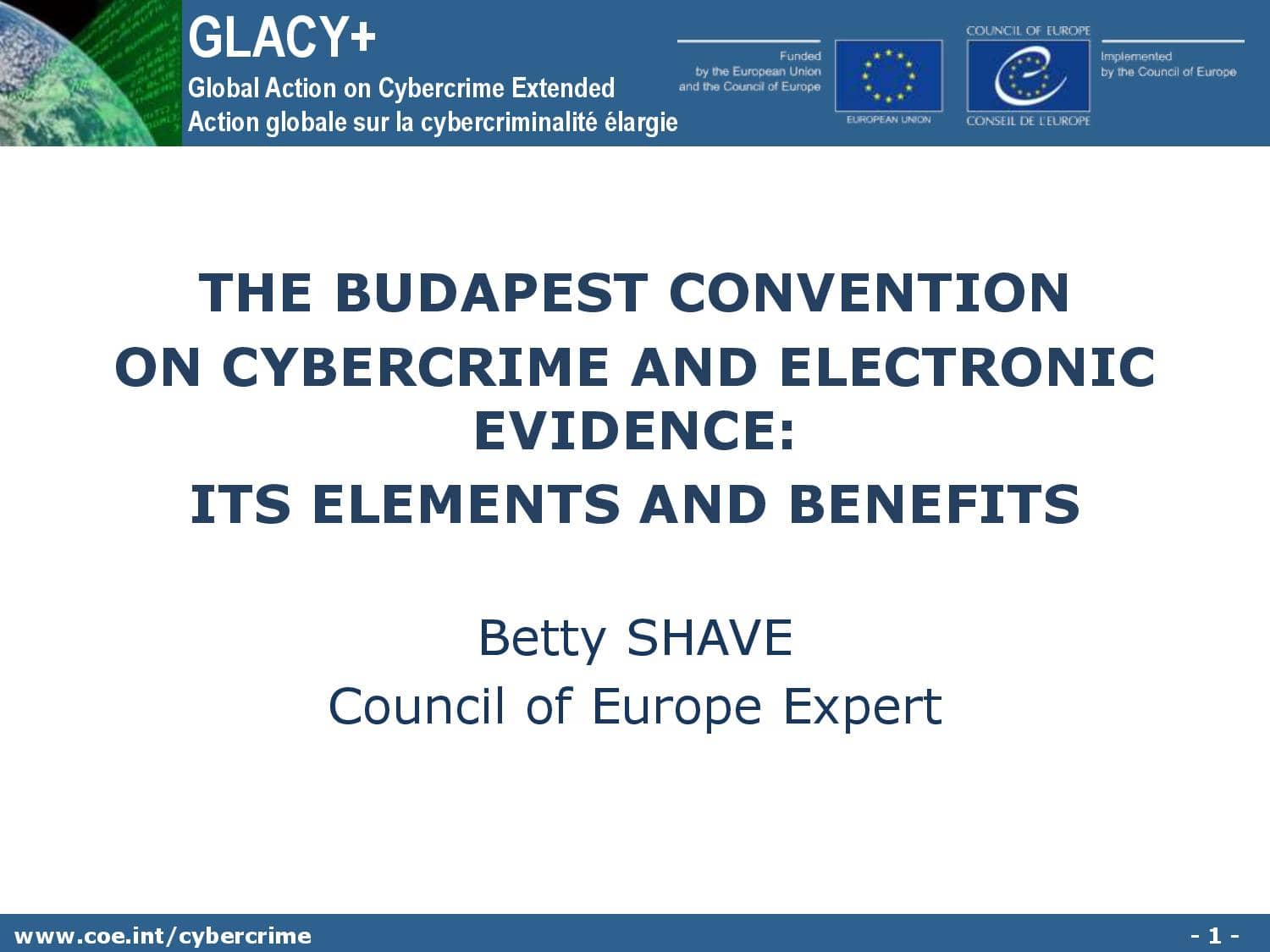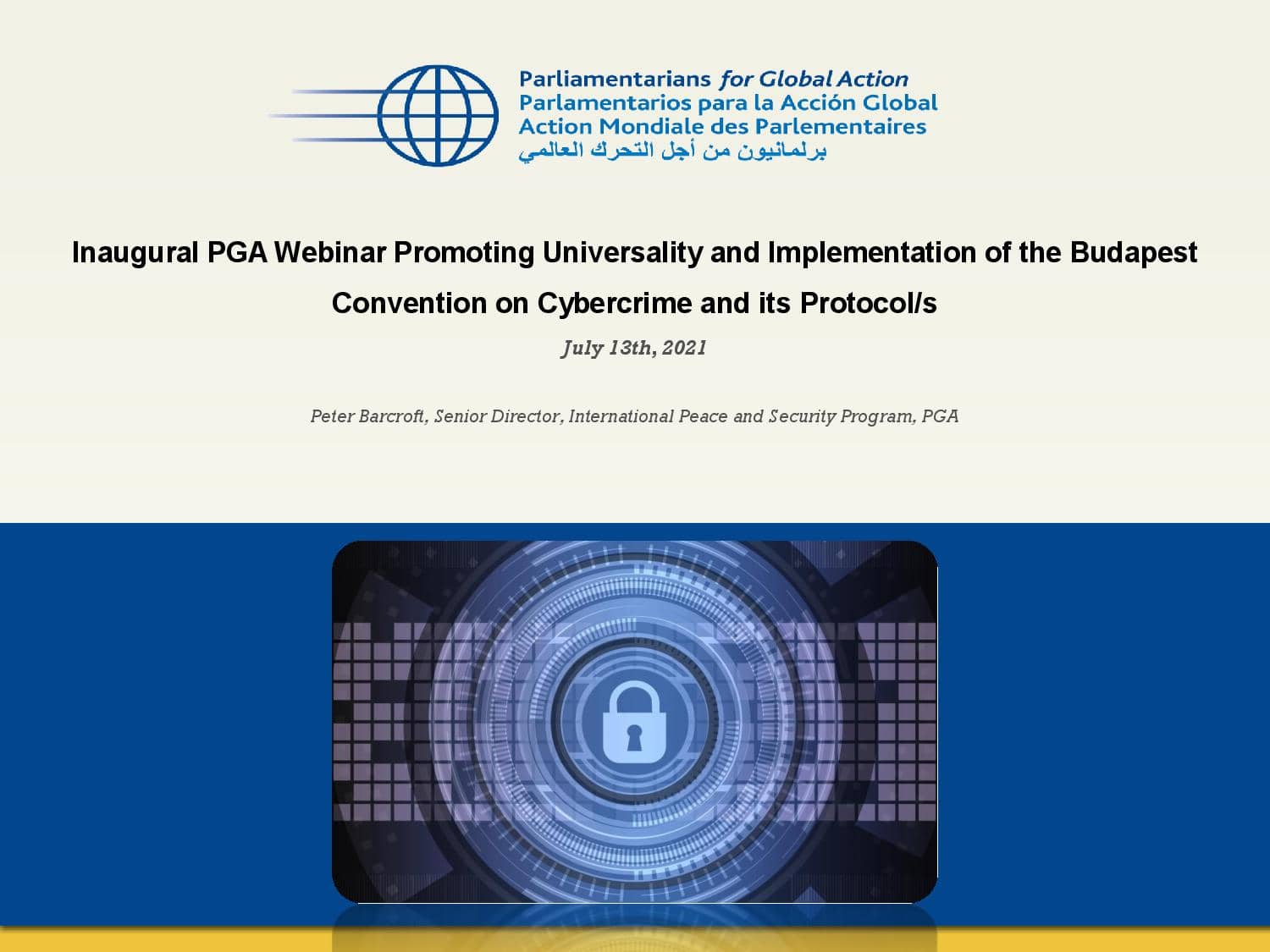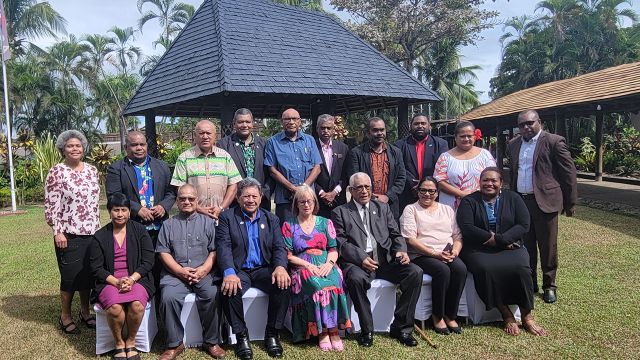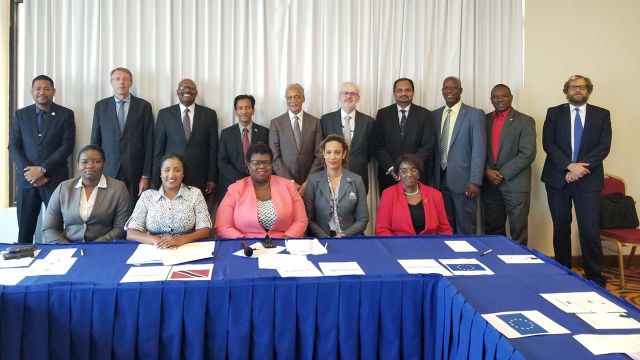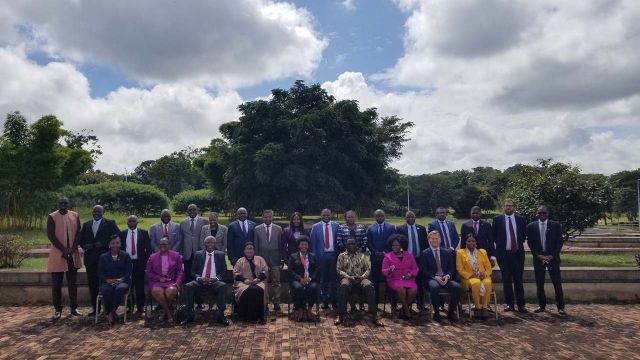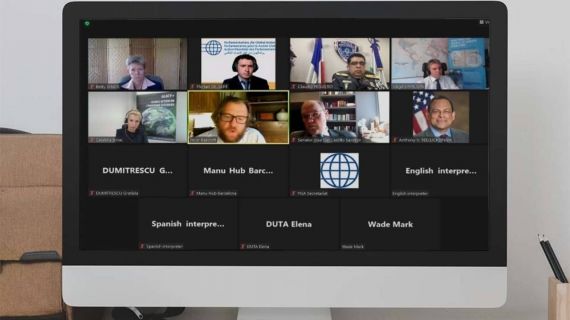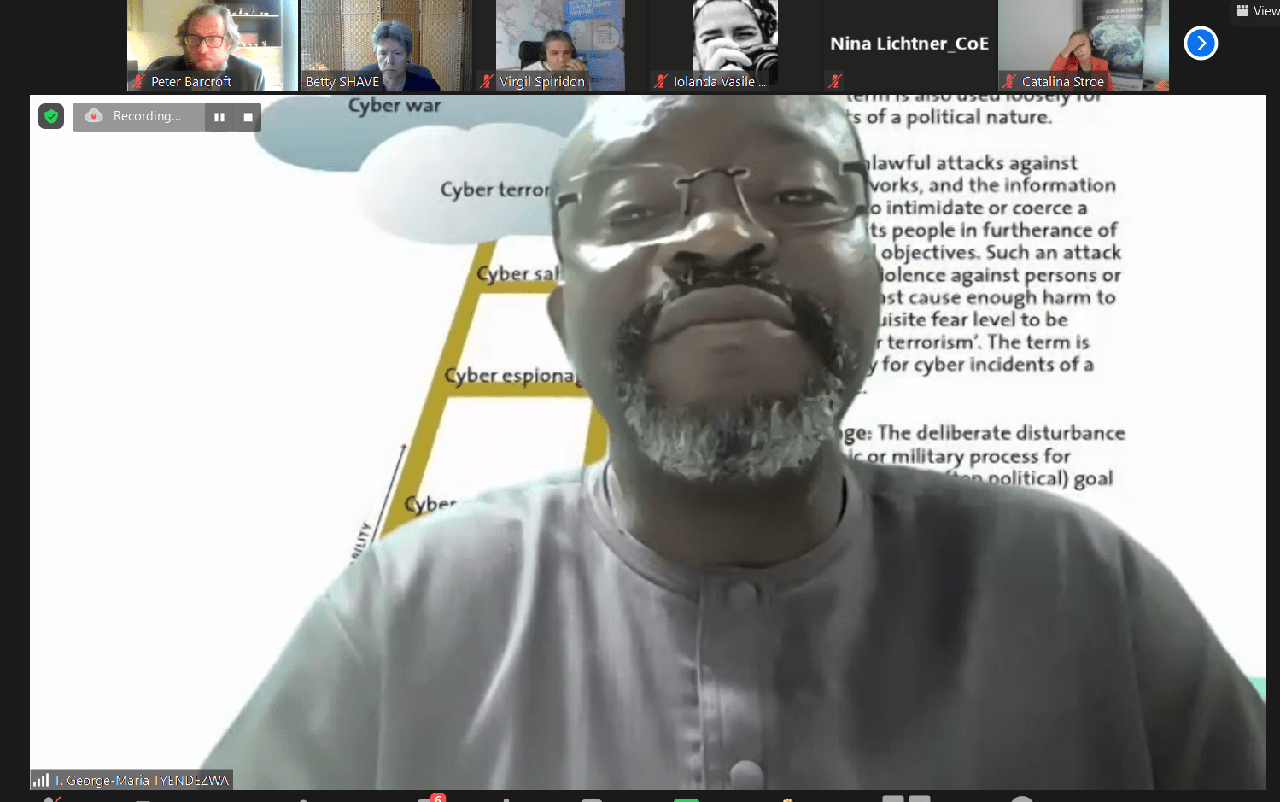
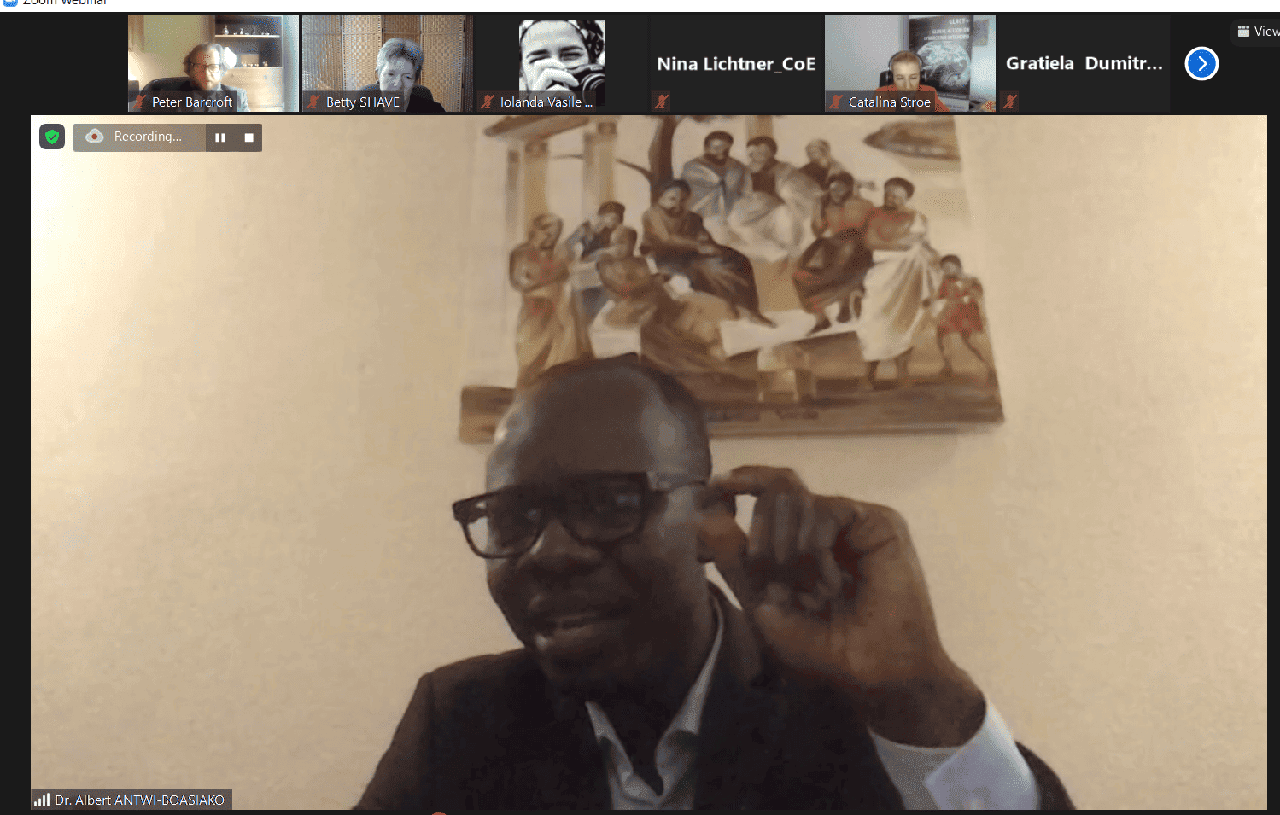
In cooperation with the Council of Europe, PGA's International Peace and Security Program organized a Regional Africa Webinar on July 13th, 2021 - Promoting Universality and Implementation of the Budapest Convention and its Additional Protocols in which 18 participants from 11 countries, Chad, Cote d’Ivoire, DRC, Eswatini, Kenya, Mali, Mozambique, South Africa, Tanzania, Togo and Zimbabwe, as well as 3 experts nominated by the Council of Europe – Cybercrime Division from the United States, Ghana and Nigeria participated. This webinar is a first of a series of 4 in Africa, Latin America, Asia/Pacific and Caribbean/CARICOM to promote Universality and Implementation of The Budapest Convention on Cybercrime and its Additional Protocol/s.
List of Panelists and Participants
|
Name |
Position |
Country |
|
Mr. T. George-Maria TYENDEZWA |
Panelist - Assistant director for the Cybercrime Prosecutor Unit |
Nigeria |
|
Ms. Betty Shave |
Panelist - Council of Europe Expert, Former Assistant Deputy Chief for International Computer Crime, Computer Crime and Intellectual Property Section, US Department of Justice. |
United States |
|
Dr. Albert ANTWI-BOASIAKO |
Panelist - National Cybersecurity Advisor |
Ghana |
|
Mr. Franck Olivier Kouame |
Representative from the Cote d'Ivoire government |
Côte d’Ivoire |
|
Hon. Petros Mavimbela |
MP, Speaker of Parliament |
Eswatini |
|
Hon. Boukar Païlapi |
MP |
Chad |
|
Hon. Jean-Marc Lombaku |
MP |
DRC |
|
Hon. Millie Odhiambo |
MP |
Kenya |
|
Hon. Antonio Niquice |
MP |
Mozambique |
|
Hon. Fikile Xasa |
MP |
South Africa |
|
Hon. George Michalakis |
MP |
South Africa |
|
Hon. Pindi Chana |
MP |
Tanzania |
|
Hon. Yaovi Attigbé IHOU and 3 parliamentarians from the Defense Committee |
MP |
Togo |
|
Hon. Ability Musavaya Gandawa |
MP |
Zimbabwe |
|
Hon. Innocent Gonese |
MP |
Zimbabwe |
|
Hon. Webster Kotiwani Shamu |
MP |
Zimbabwe |
|
Ms. Essossimna Balouki |
Minister of Trade and of the Promotion of Private Sector |
Togo |
|
Ms. Aissata Touré DIALLO |
Former MP |
Mali |
|
Mr. Virgil Spiridon |
Head of Operations, Cybercrime Program Office of the Council of Europe (C-PROC) - CoE |
Romania |
|
Ms. Catalina Stroe |
Program Manager - Cybercrime Program Office (C-PROC) - CoE |
Romania |
|
Ms. Nina Lichtner |
Program Officer - Cybercrime Division - CoE |
France |
|
Mr. Peter Barcroft |
Director of the International Peace and Security Program of PGA |
United States |
|
Mr. Florian Delsert |
Program Associate - International Peace and Security Program of PGA |
United States |
The Webinar was opened by Mr. Peter Barcroft, Director of the International Peace and Security Program of PGA, providing an extensive overview of the importance of the subject matter of the Webinar. Following, Mr. Virgil Spiridon, Head of Operations, Cybercrime Program Office of the Council of Europe (C-PROC), outlined the role and functions of C-PROC as well as the main attributes of the Budapest Convention and its sphere of activities.
The first presentation was made by Ms. Betty Shave, Former Assistant Deputy Chief for International Computer Crime, Computer Crime and Intellectual Property Section, US Department of Justice. She discussed the importance of the Budapest Convention in the criminalization procedure as well as international cooperation and, the compatibility with the African Union’s Malabo Convention. Then, she moved to the scope of the Budapest Convention which includes the criminalizing conduct, the procedural tools and the international cooperation and ended with a few points on the process to join the Budapest Convention. She signaled that the Malabo Convention has not yet entered into force which is another reason for taking action with respect to the Budapest Convention in the nearer term.
The second presentation was made by Mr. Peter Barcroft, Director of the International Peace and Security Program of PGA, which examined the numerous pragmatic steps that Parliamentarians, both as advocates and lawmakers, can take to promote universality and implementation of the Budapest Convention and its Additional Protocols. He also discussed a few examples of cyberattacks that targeted national parliaments in Finland, Norway, Belgium, and Australia before concluding by introducing examples of legislations from South Africa and Chad.
The third presentation was made by Dr. Albert ANTWI-BOASIAKO, National Cybersecurity Advisor for the Government of Ghana, who talked about the experience of his country in the accession to the Budapest Convention and his cooperation with the Council of Europe. In his excellent speech, he particularly emphasized on the importance of the Budapest Convention and its unique benefits to criminalize cybercrime in comparison of the Malabo Convention.
The fourth and last presentation was made by Mr. T. George-Maria TYENDEZWA, who shared his experience with the Convention and with working with the Council of Europe, in particular, the technical assistance and the implementation of the Budapest Convention. He also pointed out that he was able to get a certain level of assistance in regard to the implementation of the legislation but also in the investigative support needed. Mr. T. George-Maria TYENDEZWA also stressed that the capacity building did not only cover solely the scope of the Budapest Convention but covered the whole spectrum of cybersecurity.
Participants had the chance to give comments and ask questions to the panelists during the interactive dialogue session. In her remarks, Hon. Millie Odhiambo, from Kenya, raised the issue of child abuse in social media. Ms. Shave accurately answered by underlining the importance of the Convention of Budapest in order to collect digital evidence and to criminalize such actions. The Minister of Trade and of the Promotion of Private Sector of Togo, Ms. Essossimna Balouki, asked if the Convention covers the entire world and what is the complementarity with the Convention of Malabo. Hon. Boukar, from Chad, asked a question about the paragraph 2 of the Convention and how are African states included in the Plan of Action. He also asked how the Convention of Budapest is compatible with the Convention of Malabo. Ms. Toure Diallo, former MP from Mali, asked how the Assistance with the Council of Europe works. Hon. Ihou from Togo asked how the Convention of Budapest benefited African countries if the examination of applications is made in European countries. Hon. Pindi Chana, from Tanzania, asked for advice from the representatives from Nigeria and Ghana. Lastly, Hon. Jean-Marc Lombaku, from DRC, made the comment that the webinar and the participation of the panelists was excellent and that now, he would need to exchange on good practices with other parliamentarians.
In his concluding remarks, Mr. Spiridon underlined a few key points. Cybercrime is a transversal and global phenomenon. Criminal justice needs to be equipped with appropriate tools to fight it. Policymakers need to be made fully aware of these issues and finally, that the Budapest Convention works together with the Malabo Convention.
Lastly, Mr. Peter Barcroft, Director of the International Peace and Security Program of PGA, concluded the webinar by thanking all the attendees for the level of interactive discussion and reminded that parliamentarians have a decisive and central role to play in promoting universality and implementation of the Budapest Convention and its Additional Protocols.

